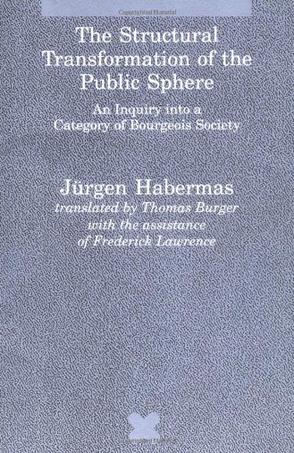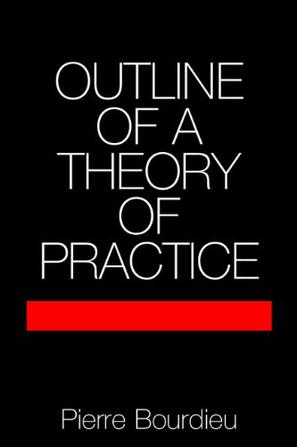-

交往行为理论
《交往行为理论》这部著作是涉及面相当广泛。这部著作中,马克斯・韦伯(Max Weber)占据了一个更为突出的位置,并且这些诠释的素材更加集中在哈贝马斯自己思想的观念图式上。哈贝马斯在这本书的开篇就声称,交往行为理论既非一种元理论,也非一种借助其它手段进行的认识论的继续。交往行为理论的分析让我们联接了与社会分析相关的三种理性:一个是涉及解释学和英美分析哲学中作为论争的理性,特别是关系到相对主义的问题。如果不同文化或生活方式有他们自身内在的合理性标准,那么在何种意义上才可能按照普遍性的标准比较他们并使其服从于批评?另一个是涉及到行为理性,即如何领会人的行为中有特殊意义的性质?这触及到理解的意义问题,还触及到了当行为者本人已经为他们的行为设定了理由时,社会科学在主张更好的解释时其自身的任务问题。最后一个是是关于理性的社会扩张问题,即作为现代西方社会特有的那种合理化问题。这本书的大部分努力就是致力于此。哈贝马斯断言:理性更多地是与运用知识的方式联系在一起,而较少地与知识有关。如果我们认为在一些情境中谈论某事是合理的,那么,我们就会明白这要么是指人们表达的认识,要么是指包含认识的符号表达形式。我们说某个人理性地行动,或者说某种陈述是合理的,实际上就是说这个行为或陈述可以被有关的某些人批驳或辩护,而这恰恰就是他们为了能够证明自己是正当的或有根有据的。我们不能像经验主义者那样,限制理性行为的范围和对客观世界的认识。我们必须以“交往合理性“的概念来弥补“工具认知理性“的不足。正如哈贝马斯自己所说的,合理性意味着交往,因为只有符合与至少另一个人达成相互理解的必要条件时,某事才是合理的。 -

礼物
在莫斯对“礼物”的分析中,根本问题是要探究人是如何与物以及通过物而与他人彼此互相关联的。通过对丰富的民族志资料的旁征博引,莫斯提出了以“整体性呈赠”为特征的“礼物经济”的概念,并与现代的、非人格化的商品交换体系相比较,提出了一个三阶段式的演进图式,并进而探讨了物权与契约等经济概念的源起及本质。 -

The Structural Transformation of the Public Sphere
This is Jurgen Habermas's most concrete historical-sociological book and one of the key contributions to political thought in the postwar period. It will be a revelation to those who have known Habermas only through his theoretical writing to find his later interests in problems of legitimation and communication foreshadowed in this lucid study of the origins, nature, and evolution of public opinion in democratic societies. -

Discipline & Punish
In this brilliant work, the most influential philosopher since Sartre suggests that such vaunted reforms as the abolition of torture and the emergence of the modern penitentiary have merely shifted the focus of punishment from the prisoner's body to his soul. -

被围困的社会
这部由当今最富独创性的社会思想家之一书写的非凡著作,试图寻求这种转型的轨迹,并试图评估它给普通个体的生活状况所带来的后果。书的第一部分致力于探讨新的全球性舞台:由于全球化的强大力量,人们已找不到外部的、隐蔽的空间去逃避和躲藏,过去的领土战争让位给了新型的“侦察战”。第二部分主要讨论由生活政治掌控大局并繁荣起来的背景。鲍曼认为,我们今天面临的巨大挑战是:能否找到新的途径将我们与生俱来的人性差异重铸为人类团结的天职。 -

Outline of a Theory of Practice
Outline of a Theory of Practice is recognized as a major theoretical text on the foundations of anthropology and sociology. Pierre Bourdieu, a distinguished French anthropologist, develops a theory of practice which is simultaneously a critique of the methods and postures of social science and a general account of how human action should be understood. With his central concept of the habitus, the principle which negotiates between objective structures and practices, Bourdieu is able to transcend the dichotomies which have shaped theoretical thinking about the social world. The author draws on his fieldwork in Kabylia (Algeria) to illustrate his theoretical propositions. With detailed study of matrimonial strategies and the role of rite and myth, he analyses the dialectical process of the 'incorporation of structures' and the objectification of habitus, whereby social formations tend to reproduce themselves. A rigorous consistent materialist approach lays the foundations for a theory of symbolic capital and, through analysis of the different modes of domination, a theory of symbolic power.